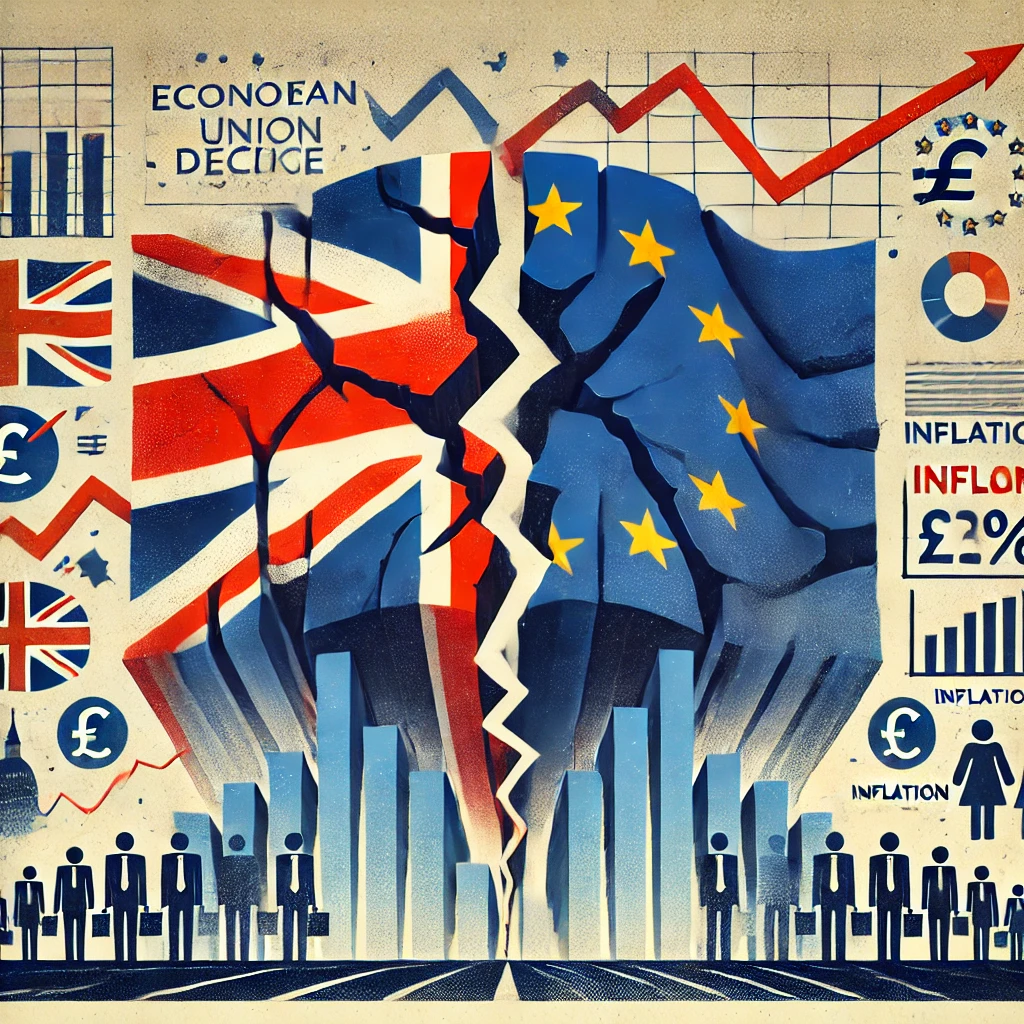The United Kingdom’s decision to leave the European Union, commonly known as Brexit, has shaped the nation’s economic landscape in profound ways. From trade disruptions to labour shortages, the ripple effects of Brexit are evident across various sectors. This blog explores the key areas of impact, focusing on inflation, jobs, and what the future holds for the UK economy.
The Economic Expectations of Brexit
Before the 2016 referendum, economists predicted that Brexit would create significant challenges for the UK economy. Concerns included potential declines in GDP, disruptions to trade, and labor mobility constraints. Many foresaw increased inflation due to a devalued pound and potential tariffs, alongside job losses stemming from reduced foreign investment and economic uncertainty.
These predictions have, in many respects, materialized, with Brexit reshaping the UK’s economic priorities and operational structures.
Brexit’s Influence on Inflation
The immediate aftermath of the Brexit vote saw the pound sterling plummet against major currencies, increasing the cost of imports. This currency devaluation was a significant driver of inflation, with consumer prices rising sharply in subsequent years.
According to studies, Brexit contributed approximately 2.9% to the UK’s inflation rate, adding an annual burden of around £870 for the average household. Essential items such as food and fuel were particularly affected due to new trade barriers, disproportionately impacting lower-income families.
Moreover, ongoing supply chain disruptions and increased costs of doing business have sustained inflationary pressures, keeping prices high across the board.
The Job Market Post-Brexit
Brexit has significantly altered the UK’s labor market. The end of free movement between the UK and the EU resulted in a decline in the EU workforce, creating labor shortages in key industries like agriculture, healthcare, and hospitality.
- Labor shortages: Seasonal sectors such as farming have struggled to fill roles traditionally occupied by EU workers, leading to operational challenges and increased costs.
- Unemployment trends: While the overall unemployment rate has remained low, job vacancies reached a record 1.3 million in 2023, reflecting mismatches between available jobs and worker skills.
- Financial sector: The City of London, a global financial hub, has experienced a decline in job vacancies and significant relocations of roles to EU cities like Amsterdam and Frankfurt.
The combination of these factors underscores the complexities of transitioning to a new labour model post-Brexit.
Industries Hit the Hardest
Certain industries have felt Brexit’s impact more acutely than others:
- Agriculture: The industry has been hampered by a shortage of seasonal labor, affecting harvesting and production.
- Hospitality: Staffing issues and higher operational costs have forced many businesses, including pubs and restaurants, to close. Over 300 pubs shut down in England and Wales during the first half of 2024 alone.
- Financial Services: The sector has lost approximately 40,000 jobs to EU cities, alongside a 17% drop in job vacancies in London compared to the previous year.
These challenges highlight the sector-specific hurdles that Brexit has introduced.
The Future of the UK Economy
Looking forward, the UK faces a mixed economic outlook. While Brexit offers opportunities to negotiate independent trade agreements and implement unique policies, the costs associated with trade disruptions, inflation, and labour shortages remain significant.
Recent estimates suggest the UK economy is £140 billion smaller than it would have been had the country stayed in the Single Market. Moreover, the average citizen is nearly £2,000 worse off annually due to the combined effects of Brexit and inflation.
However, with effective policymaking and strategic investment, there is potential to mitigate some of these challenges and chart a more stable economic path.
Brexit has undeniably reshaped the UK economy, bringing both challenges and opportunities. Inflation and job market shifts have been among the most visible impacts, affecting households and businesses alike. As the UK navigates this new era, the ability to adapt and leverage its independence will be crucial in determining its economic trajectory.
By understanding the consequences of Brexit and addressing its challenges head-on, the UK can work toward a more resilient and thriving economy in the years to come.

